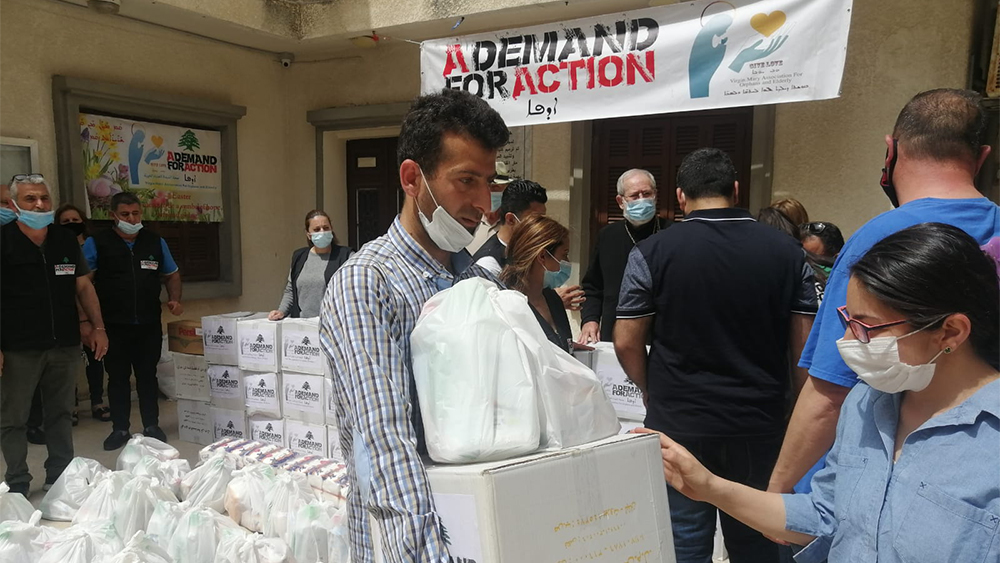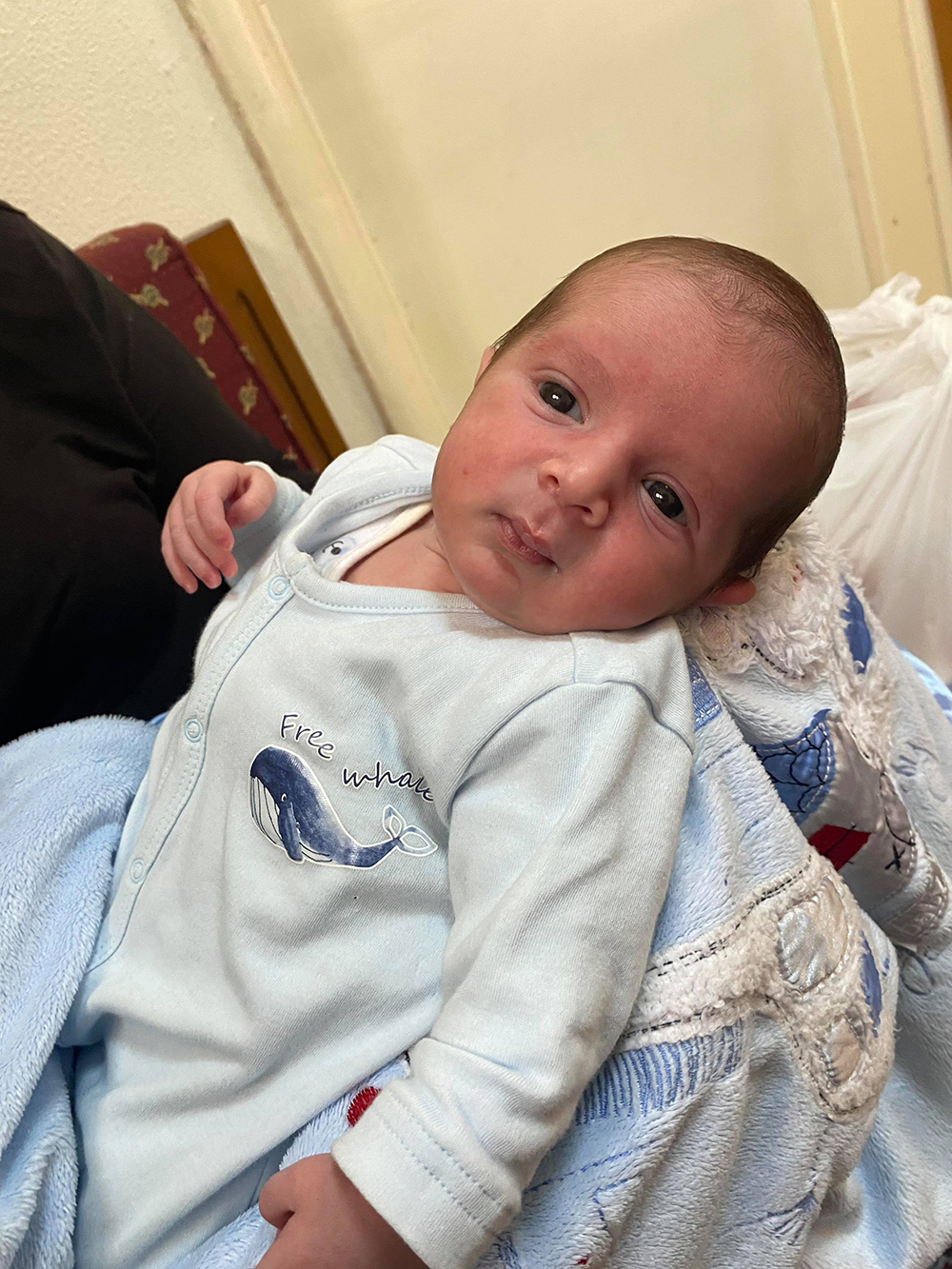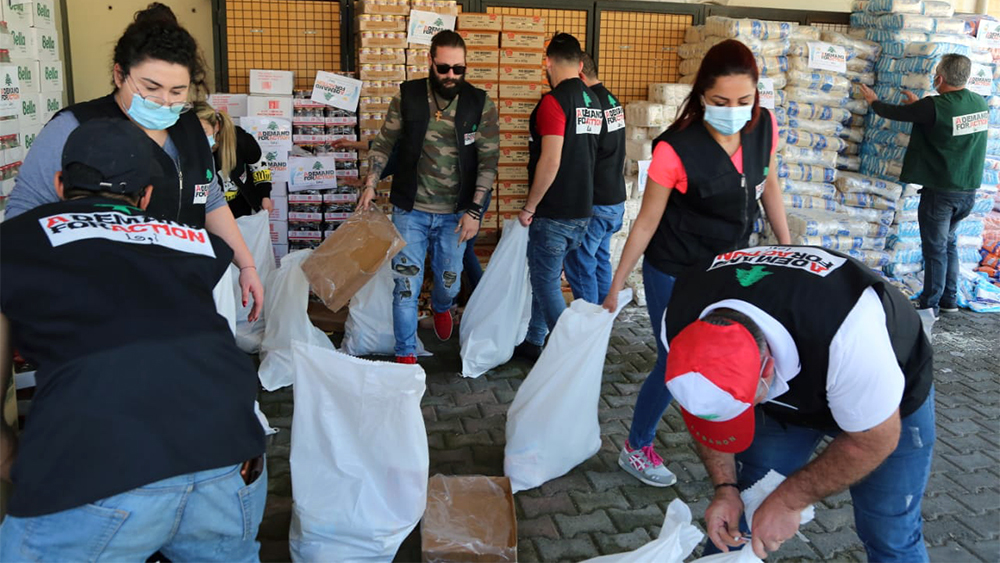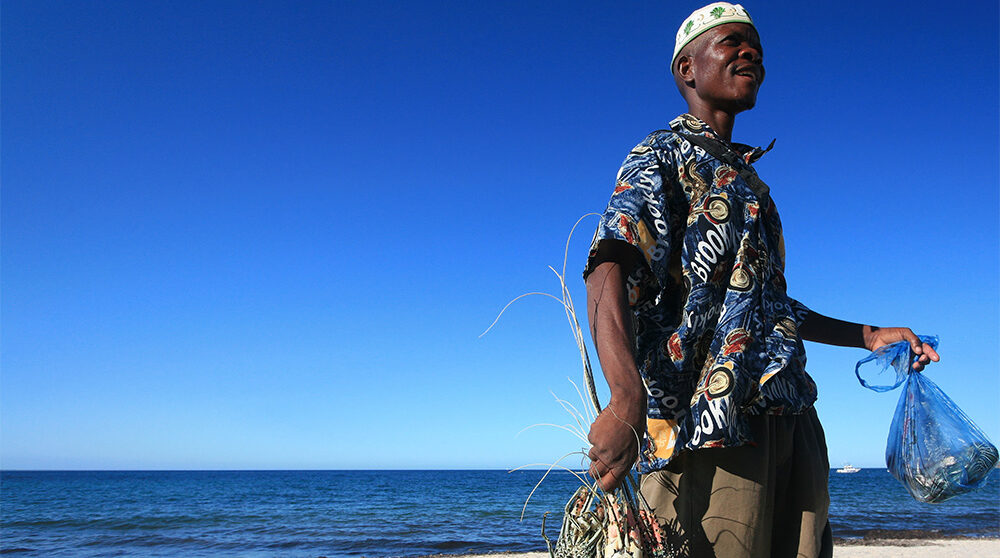Their family members were murdered by ISIS, they have been expelled and persecuted, now they are fighting to survive the day. Nuri Kino, journalist and founder of the organization A Demand For Action, writes about two intensive days of relief work in Beirut, while he and many others are waiting for an important signal and many are holding their breath. Will Biden acknowledge the genocide of the Ottoman Empire? A White House leak suggests that on April 24, President Joe Biden might acknowledge the genocide of Christians by the Ottoman Empire in 1915.
It is a symbolic date. On the night of April 24, 1915, more than 100 Armenian intellectuals were arrested in Constantinople (Istanbul). They were executed shortly afterwards. It was the start of the genocide of Christians by the Ottoman Empire. At least 1.5 million Christian Armenians, Assyrians/Chaldean/Syriacs and Greeks were then slaughtered.
I’m in Lebanon, for more than 6 years we have helped victims of the 2014 Genocide. The way this is connected to the modern genocide is described below.
For a moment, in the darkness, a light shone on the fate of Iraq’s Christian* indigenous people and other minorities. But the spotlights on the Pope’s visit to Iraq have now gone out.
Since 2004, many of us have fought to shed light on the plight of Iraq’s indigenous people, its religious and ethnic minorities. It has taken 17 years for the world media to give us satisfactory reports about their plight. The Pope’s visit was a tremendous win. Media from all over the globe laid bare the atrocities against Christians, Yazidis, Mandeans and others. A genocide. But what about the victims left behind, the survivors and their needs?
I’m well aware that the wars in Syria in Iraq have affected all the country’s inhabitants, no matter their religion and ethnicities. I’ve also helped to expose the horrifying and endless suffering of Yazidis, 8,000 of their women and girls kidnapped and subjected to tortures beyond comprehension. As of August 2020, nearly 3,000 Yazidis were still missing. Hundreds of thousands remain in Internally Displaced Persons camps in Northern Iraq living under squalid conditions.
Recently, I watched Once Upon a Time in Iraq, a five episode 2020 British documentary, and I was astonished to find no mention of the hundreds of churches that were bombed, all the clergies who were killed and the systematic cleansing of Christians in Iraq. I’ve lived with this knowledge for 17 years, the first ten years as a journalist and author, and since 2014 also as an activist, or rather, one of the voices of the unheard
In autumn 2004, the first horrifying video from Iraq showed up on my laptop. Less than a year after the fall of Saddam Hussein, the ethno-religious cleansing of Iraq began with a grotesque video announcing the murders of three young men. That day we learned of a new term “beheading.” One of the men was young Raymond Shamoun. He looked straight into the camera, his eyes clouded with fear, begging for his life. Seconds later a slow knife cut through his throat … According to the al-Qaida, he, Fadi ( also a Christian from Mosul) and an Egyptian man were”kuffar”, infidels and traitors.
Fast forward to April 15th 2021 and Beirut. Our Sweden/based grassroots human rights and charity organization, A Demand For Action (ADFA) began in response to the ISIS genocide in the summer of 2014. For six years now we’ve been distributing food in Lebanon, Syria and recently also Armenia. Most people registered with us in Beirut are Iraqi and Syrian refugees forced to flee from the terrorist’s violence, and we distributed 30 tons of food and hygiene articles to 830 families.

Unfortunately not everyone is eligible for aid, one day, about 100 unregistered people stood in line and refused to leave. I cautioned them that they must be careful, they’d been too close to each other for several hours. But no one listened. They were wearing masks and we sprayed their hands with sanitizer to reduce the spread of infection as much as we could. But because they were unregistered we couldn’t give them our scarce supplies. People were desperate and some had forged information in order to get bread for their children. We had to calm down some of our volunteers and the needy when shouting erupted. I understand why people resorted to cheating to get food for their children. Who wouldn’t?
”You should be ashamed, you know very well who my brother was and what my family has sacrificed to save the lives of others, and now we are not worth a piece of bread,” a woman shouted at me. I had no idea what she meant. She showed me a picture of her brother on her cell phone. Then she broke down, cried, sobbed, stopped breathing… and fainted.
I understand why people resorted to cheating to get food for their children. Who wouldn’t?
After we revived her, she told us her name was Meyada. Her sister Ghada and her husband Salah were also among those not registered. And she was right, we recognized her brother’s name. He fought against the terrorists and saved 48 Christian families. The last thing Meyada heard from him was when he called and said ”the Islamic State has taken me.” The call was interrupted. That was almost seven years ago. They and their families have been refugees in Beirut for over five years. Without help. Forgotten among the massive number of refugees in Lebanon and in the world. While they were telling us about the day ISIS painted the letter N for Nazari (Christians) on their houses in Mosul I suddenly realized they must have been neighbors with Raymond Shamoun. The man I first saw beheaded in that hideous video.
”We were neighbors, I saw when they took him. They were not even masked, they forced him into the trunk of a car; that was the last time we saw him until the video was circulated throughout Mosul. They even sold copies of it in shops,” Salah told us. We promised Meyada and all the others who didn’t get food to come to our office the next day for their share.
The first one to arrive was Leyla. One of our volunteers (a refugee from Iraq herself) asked Leyla how she was. Leya immediately broke down in tears. She showed us photos of her family. She only has one son left. Her two other sons died in Iraq. One was killed when he was stopped and asked for his id-card, it said ”Masihi” for Christian. That was enough reason for the terrorists to ambush him. Her brother was killed in the same way. Her second son died from a stroke caused by all the distress. She has one surviving son, now 36 years old. He was born with a brain disease and is not fully functional.
Our volunteers cried too, when Leyla could not stop. Hiba, from Damascus made me promise not to tell her story, it’s mindblowing. Another one of our volunteers, Lena, lived in hell back in Baghdad. Only by a miracle did she, her husband and children survive after threats to kill them if they didn’t leave their house and their country.
We had to close the door, afraid of the spread of the corona virus, because the needy in the line, both Lebanese and refugees, found it hard to observe caution. So they came in slowly, two by two. Feryal, another of our volunteers showed Raqqiya and her sister Fatina in. They gave us their documents. She and her daughter were in the Syriac Catholic church massacre of October 2010 in Bagdad. Six suicide jihadists attacked the church during mass. 48 parishoners were killed and 80 other people injured.
I’d heard about that attack from a man who called me from the bathroom of the church. He wanted me to report it, hoping that might save lives. He had my number because he was one of the asylum seekers that Sweden had deported back to Iraq, illegal deportations I investigated for Swedish radio. Over the phone I heard two young priests plead with the terrorists not to kill anyone. When they were found afterwards, the clergy’s bodies had been sprayed with bullets.
Later that afternoon Feryal suggested that we pay a visit to Ashur’s mother who was sick and weak. Ashur was kidnapped at the same time as Feryal. Ashur and two others were then forced to wear orange jumpsuits and shot in the head from behind as shown on an ISIS camera. I promised to take food and medicine to his mother.
From the kitchen I heard children’s voices. When I went to see who they were I couldn’t believe my eyes. Feryal’s daughters. Now teenagers. While hugging them I couldn’t help of thinking of their cousin that one of the terrorists took as a wife while they were captives. Today, no one knows of her fate.
Along with 200 others, Feryal’s entire family was kidnapped by ISIS, in February 2015, in Khabour, northeastern Syria, and brought to Raqqa—she, her husband and their children. What they have experienced is almost impossible to absorb. The lives of these children, and those of others in the same situation, who were finally liberated, have completely stagnated during their time as refugees.
Another kid ran from the balcony to hug me and the other adults – little Waskin who’s family we found in a Beirut slum. His father had fought the terrorists and was wanted, so the family fled from Hassake in Syria, leaving their beautiful house, to the Beirut ghetto. Seeing Wasking reminded me of another child from Hassake who’s father’s arm was chopped off because he had mother Mary tatooed on it. Later the same day they sent his wife Iptisam a message saying that she’d better take her daughter and leave their house or he’d be killed. They did flee but he was killed anyway. I was glad to hear from our volunteers that Iptisam had received food.
Later that evening I went to an apartment in Burj Hamoud, the Armenian neighborhood in Beirut, close to the port that exploded on August 4th 2020. Five people had called me, all from the Syrian city of Qaryatayin. Three of them were kidnapped in 2015. Ransom had to be paid to release them. Two have family members who are still missing. No one knows what has become of them.
Leaving the poorly furnished, cold apartment, I felt I had no strength left. The corona situation, the refugee’s suffering, all the trauma and the plight of the Lebanese themselves emptied me of energy. But in comparison, I have nothing to complain about.
The next day I had lunch with a dear friend, the Lebanese filmmaker Eliyas Salameh who has made two documentaries about the lives of Iraqi and Syrian Christians. He reminded me about Rita, one of the women we interviewed for our short film ‘Limbo’. She was also kidnapped by ISIS and sold several times but she managed to escape. After my six hour phone interview with her, Eliyas and the crew filmed a new interview with her … She told us that she is stuck, like all others – in limbo.
During our lunch I asked Eliyas about his family, friends, and conditions in Lebanon. I wanted to learn why his motherland has changed from being one of the most flourishing countries in the Middle East to a place where the cost of food has tripled in just one year.
According to a study a study released by the United Nations Social and Economic Commission for Western Asia the percentage of the poor in Lebanon doubled to reach 55 percent in 2020, from 28 percent in 2019, while the percentage of people suffering from extreme poverty increased from 8 to 23 percent during the same period.
Eliyas didn’t want to talk about it. ”I live in denial, I don’t want to be reminded of the desperation of my mother land. If I think about it I will lose my mind. I’d rather talk about, for example, the Armenian genocide or what you in Syriacs call Seyfo. Will Biden recognize it on the 24th of April? Do the Americans even know about the connection between that genocide and the one in 2014?”
Eliyas reminded me of the chain of horror, just one example among many: Feryal’s grandfather fled the genocide in the Ottoman Empire, from Haqqari, southeast of today’s Turkey, to Simele in Iraq 1915. They were massacred again in 1933. The survivors, among them Feryal’s grandparents, this time fled to Syria. In February 2015 she and many others experienced yet another genocide. ISIS kidnapped them from Khabour in northeast Syria.
Before the fall of Saddam it’s estimated that 1.3 million Christians lived in Iraq. Today about 200,000 are left. So where are the others? Some have made it to USA, Sweden, Canada and other countries in the west. But many, far too many, are scattered all over the neighboring countries, in Lebanon, Jordan and Turkey.
There are no accurate numbers of how many Christians fled from Syria, but churches have estimated the figures might reach 600,000.

”July” who wants to remain anonymous picked me up, she wanted me to visit a boy that might become blind if he doesn’t get surgery, something his parents can’t afford. On our way to them she said ”thank you for raising funds for the emergency Caesarean of the refugee from Syria, she gave born to a healthy boy that they will name Tony”. As we left the house of the boy that needs a surgery to save his sight July said ”aren’t the Americans responsible for these people? They invaded Iraq, or am I wrong?”
”July” is from Sadad. In 1915 my grandmother Meyyo was found in a well, she was put there with her family members, all assumed dead. She survived, was kidnapped, and raised as a Muslim until the day she was able to run away. Nearly one hundred years later, in 2013, I was informed about another well, this time in Sadad in Syria, where a Syriac Orthodox family was found; only this time they all died.
So why is it important that President Biden recognizes the genocide? The answer lies in these (and many more) testimonies I and others have been forced to listen to over the years. If nothing else we hope the knowledge regarding the 1915 genocide will help prevent future genocides and give support and justice to the survivors of what happened in 2014.
Nuri Kino
Nuri Kino is an award-winning investigative journalist, author and founder of the organization A demand for Action.
Edited by D.J. McIntosh, Canadian author.
Note: Most Christians in Syria and Iraq are indigenous and call themselves Assyrians, Chaldeans, or Syriacs. These are different names for a common ethnicity rooted in the Mesopotamian kingdoms that flourished between the Tigris and the Euphrates rivers thousands of years before Jesus. They take pride in both being the descendants of the cradle of modern civilization and in sharing Jesus’s mother tongue Aramaic, of which they are native speakers. The Armenian people are close to them geographically and have suffered the same genocides.


